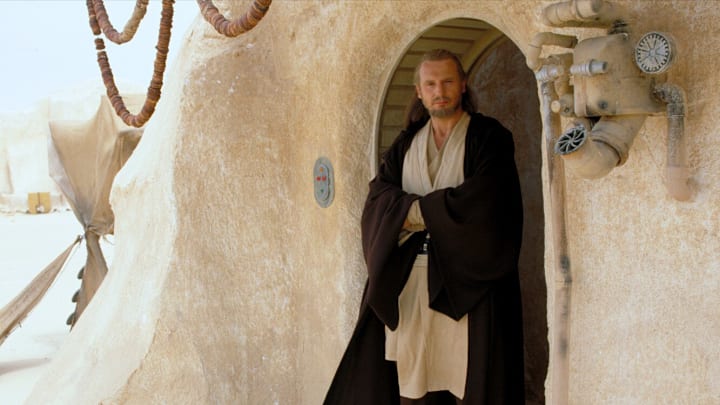It was early May 1999, and I had just gotten my ticket for the 12:50 a.m. showing of Star Wars Episode 1: The Phantom Menace. I picked up the phone to find a friend from New Hampshire in tears. Very concerned, I asked what had happened. She had just gotten the Episode I soundtrack through the library, and one of the tracks was called "Qui-Gon's Funeral."
I did not feel as devastated by this news, though it was definitely unwelcome as far as spoilers went. I had already theorized that because Obi-Wan was the Jedi Master who trained Anakin Skywalker, Qui-Gon Jinn would be out of the picture by the time the credits rolled. I was more interested in meeting the younger version of Alec Guinness' iconic character than one of his associates.
By the time Boss Nass and the Gungans celebrated peace on Naboo, I realized that this not-as-important mentor, played by that guy from Schindler's List, Liam Neeson, was vitally important to the success of that movie's overarching story.
In another of my favorite science-fiction franchises, Doctor Who, a character sits in despair at the end of his world and says, "I could do with a ridiculous miracle about now." If I were asked to describe The Phantom Menace in one phrase, "ridiculous miracle" is what would come to mind. In fact, that's a good summation for several of the Star Wars movies. For example, Rebels succeed in destroying the Death Star because the daughter of Darth Vader sent two droids to find a hermit general, and their new owner happened to be her long-lost brother. The Ewoks rallying against the Empire is another example. The fleet-that-wasn't-a-navy in The Rise of Skywalker definitely qualifies as something that shouldn't have worked as well as it did.
Yoda scoffs that the Jedi don't need Qui-Gon's defiance towards the end of The Phantom Menace, but that's stuff and nonsense. From the first scene, we see Qui-Gon as a deeply intuitive Jedi. In the first name-drop of the Prequel Trilogy, he overrides the wisdom of Master Yoda and says that being mindful of the future should be "not at the expense of the moment." He then invokes The Living Force.
With that mission statement set out, we see that his decisions are sometimes impulsive and defiant but can be chalked up to him keeping his "focus here and now, where it belongs."
A prime example of this is his attention to "pathetic life forms." Obi-Wan worries about time running short when they visit Otoh Gunga, but Qui-Gon considers the possibility that Jar Jar Binks may have a part to play as their mission continues. When he runs into a slave boy from a small junk dealer more than once, he begins to foster a friendship with the child, who offers them help. He might have an inkling of Jar Jar's ability to bring the Naboo and the Gungans together. Qui-Gon certainly follows up on his impressions that Anakin Skywalker is someone very special. However, none of these situations seem to be the driving force behind his decision to trust in the underdogs.
It's not just his choice of companions that sets Qui-Gon apart. He is at odds with beings of all backgrounds, whether a Toydarian who keeps upping the stakes or the Jedi Council who lack faith in the Chosen One. Captain Panaka would have kept looking for a safe haven for the Queen and made the situation more dire. Qui-Gon risks much to free Anakin, and a more prudent person might have stopped short of his all-or-nothing gambling tactics. Anakin would have never trained as a Jedi without Qui-Gon's stubborn refusal to give up on him. Qui-Gon is audacious, and a famous leader had this to say of such people:
"He who fears being conquered is sure of defeat."Napoleon Bonaparte
Because Qui-Gon acts without evidence of this fear, he has unlikely successes. Napoleon also describes a leader as "a dealer in hope," and this is reflected in how those who follow Qui-Gon's advice find their own bravery, whether by trusting in the Force to win a pod race, humbling themselves to gain allies, or agreeing to train Anakin.
Qui-Gon Jinn frequently goes against the grain of what is rational, but we should always remember his guide to decision-making: "Your focus determines your reality"
